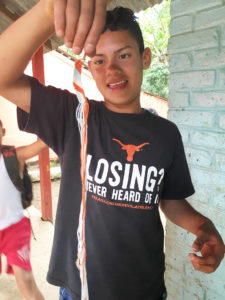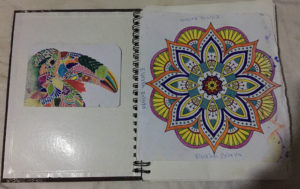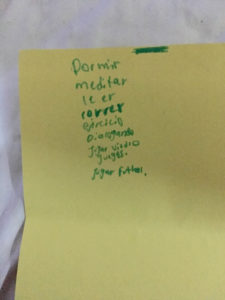
Axel 15 shows off his bracelet
When I first heard that I would be working at Los Quinchos, a residential center for youth located in San Marcos, Nicaragua, I was excited and nervous. I had worked with youth in similar situations in Immokalee, Florida and was happy to spend my summer with middle to high school aged kids again. As I started to picture how my summer would pan out, I began to plan possible projects. I wanted to start a garden which the kids would tend to and be responsible for, in order to teach them how to cultivate food as well as give them a chance to be proud of the fruits (or vegetables) of their labor and allow them to gain confidence as the garden grew.
Once I arrived at Los Quinchos, I was elated to find out that there was a plot of land I could use. However, I quickly realized that before I could launch head first into the project I would have to gain “la confianza” of the staff and kids there. “La confianza” in Spanish translates into “the confidence,” a phrase which means essentially the trust, confidence and respect that someone has for you.

Quincho coloring book
As I set out to gain this confidence through English classes, math and reading reinforcement, taking the kids to Catholic mass, playing soccer games, accompanying them to their extracurricular activities, helping them with chores and just generally having a steady presence, I began to see different trends in the kids. Many of them had little confidence in their academic abilities and would become frustrated, unmotivated and angry while working, or outright avoided doing homework, or even going to school. They also showed insecurities in things such as skin color, the way they talked, or how they were perceived by school kids (many of their peers thought of the Quincho kids as “street kids from Managua” and associated them with the negative connotations, such as a history of drug/physical/sexual abuse, violence, poverty and thievery).

Quincho vocabulary page
As I grew closer to these kids, it broke my heart to learn of the insecurities they carried and how they were stigmatized in their schools. In lieu of time and new ideas, I abandoned my garden project for something that fit the kids in their present situations. I planned discussion workshops on things such as stress and culture as well as identity, in efforts to bridge the problems the pre-teens and teenagers faced. Additionally, I started to emphasize positive reinforcement and one-on-one attention in my English classes.
My fellow volunteer Sara and I also held sessions in which we would play music while coloring or making bracelets with the children. These sessions served to promote stress relief and relaxation. They provided motivation for attending school and completing homework or chores as well as encouraging good behavior, all prerequisites for attending the sessions. We could see pride and confidence as the children proudly displayed their artwork.
Throughout my weeks here I have learned that you don’t have to make a change or have a big project to make a difference. Simply being present, positive and supportive made an amazing difference to the kids. Through the workshops, positive reinforcement during their studies, and support/pride in their work with academics, bracelets and their activities, the youth at the center blossomed. Kids who would normally run and hide from academic reinforcement would ask for more math problems or proudly come with book in hand, ready to read out loud for a while. Boys who would be rowdy, angry and stressed from the day’s activities turned into quiet creators as they brought their coloring book pages to life. Teens who complained of insecurity about their looks, abilities and background began to see themselves as individuals who were confident, intelligent, capable and not bound to their past, able to go forth and do great things.
As I come to the close of my time here in Nicaragua, I leave knowing that I will come back to see the kids I’ve learned to love, hoping that just the little things, such as being present, has made a difference.
